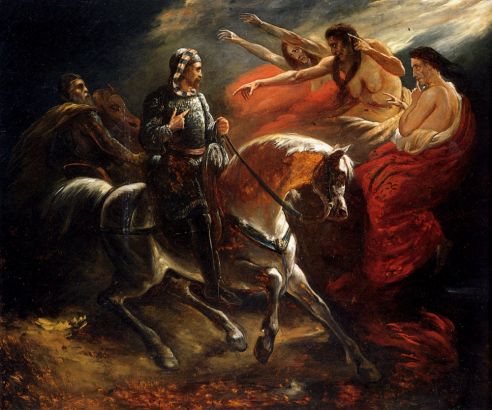
For some reason, the 3 witches have been paying excessive attention to Macbeth since he became Thane of Cawdor. Do they just predict the future or are they intent on causing trouble? No one knows.
So now we’re down to the last post. You might notice that there’s not a lot of women in Shakespeare’s plays. Well, there’s a reason for that. In the Bard’s day, all actors were men and most women’s roles were played by preteen or teenage boys or young men. Since many of Shakespeare’s heroines dressed in drag, these would’ve been men dressed up as women dressed as men. I know it’s confusing. Still, such theatrics existed because women weren’t allowed to perform on stage during Shakespeare’s lifetime. So this would mean that the original Juliet was played by a dude, which most people nowadays would consider unthinkable for obvious reasons. Nevertheless, women wouldn’t appear on stage in England until the later 1600s since King Charles II enjoyed watching actresses on stage. However, until the 1800s, actors were typically looked down upon as many actresses often courtesans and associated with promiscuity. In our final selection, I give you the last set of Shakespearean players consisting of Lady Percy, Sextus Pompey and Lepidus from Antony and Cleopatra, John of Lancaster, the Earl of Warwick, Eleanor of Gloucester, Florizel and Perdita from The Winter’s Tale, Virgilia and Tullus Aufidius from Coriolanus, Owen Glendower, Lucentio from Taming of the Shrew, the Witches from Macbeth, Paroles from All’s Well That Ends Well, and the Ghost from Hamlet.
136. Lady Kate Percy

“O my good lord, why are you thus alone?/For what offence have I this fortnight been/A banished woman from my Harry’s bed?/Tell me, sweet lord, what is ‘t that takes from thee/Thy stomach, pleasure, and thy golden sleep?/Why dost thou bend thine eyes upon the earth,/And start so often when thou sit’st alone?/Why hast thou lost the fresh blood in thy cheeks/And given my treasures and my rights of thee/To thick-eyed musing and cursed melancholy?” – Act II, Scene 3 in Henry IV Part 1. Wonder what’s keeping Hotspur from sleeping with his wife. Then again, that’s Lady Mary so it kind of explains a lot.
From: Henry IV Parts 1 and 2
Pro: Well, she’s practically a saint as well as witty, patient, and playful with her beloved husband. Calls out her father-in-law for sending her husband to war before calling in sick.
Con: However, she tends to be horny and neglected since her husband prefers the battlefield to their bedroom. Always complains about his disinterest in sex and on more than one occasion, playfully threatens to “break” his dick (which is the medieval equivalent of going Lorena Bobbit on him). It doesn’t work and he gets killed.
Fate: Ends up a widow as of Henry IV Part 2.
137. Sextus Pompey the Younger

“My powers are crescent, and my auguring hope/Says it will come to th’ full. Mark Antony/In Egypt sits at dinner, and will make/No wars without doors. Caesar gets money where/He loses hearts. Lepidus flatters both,/Of both is flattered; but he neither loves,/Nor either cares for him.” – Act II, Scene 1. Well, Pompey seems to have insight to the political situation. Too bad he’s too honorable for his own good.
From: Antony and Cleopatra
Pro: Despite being a pain in the ass for the Romans, he’s actually an okay guy. Is guided by reason and honor instead of passion. Plays by the rules. Well loved by the people. Faces his fate nobly. Is willing to negotiate against his enemies before he goes to war with them. Would rather compromise than have blood shed, not out of cowardice but common sense. Also, invites his enemies to party on his boat and refuses have any of them killed. Because when he makes a truce, he means it.
Con: Gets confused for his more famous dad in the history books. Rebels against Rome in order to avenge his dad’s death at the hands of Julius Caesar and against the new triumvirate. Also, he would’ve fared better if he listened to Menas and have the drunken triumvirs killed since these are guys would probably shoot him in a back alley (well, except Antony).
Fate: Ends up executed on Octavius Caesar’s orders.
138. Lucentio

“Love wrought these miracles. Bianca’s love/Made me exchange my state with Tranio,/While he did bear my countenance in the town.” – Act V, Scene 1. However, he has no idea on what Bianca’s really like. He just loved what he saw of her.
From: Taming of the Shrew
Pro: Devises an intricate and fanciful fan to get into Bianca’s pants by disguising himself as her tutor. Convinces her to defy her dad. Seems to be a better guy than Petruchio at first, especially in how he treats Bianca since his desire to marry is based on romantic love.
Con: He’s an idiot who has no idea what he’s doing. Quickly abandons his education to fall in love and later elope with Bianca. However, he tends to fall for what he initially sees like her exterior façade, not her as a person.
Fate: Marries Bianca but loses the bet to Petruchio. Guess he didn’t know what he was getting into. Loses some money and street cred.
139. Lepidus

“Noble friends,/That which combined us was most great, and let not/A leaner action rend us. What’s amiss,/May it be gently heard. When we debate/Our trivial difference loud, we do commit/Murder in healing wounds. Then, noble partners,/The rather for I earnestly beseech,/Touch you the sourest points with sweetest terms,/Nor curstness grow to th’ matter.” – Act II, Scene 2. Sure he may be right. But remember, this “let’s rule Rome together thing,” isn’t really working out too well.
From: Julius Caesar and Antony and Cleopatra
Pro: Generally a good guy with a conciliatory nature and tries to make everyone friends.
Con: Weakest of the second triumvirate. Is blind to everyone’s passion and treachery. Doesn’t do much. Is seen as a laughingstock even to his friends and inferiors, especially when he gets drunk. Is more interested in Egyptian animals than Antony and Octavius getting on each other’s nerves. So naïve that he’s torn between men he thinks are his friends but ends up losing his position and freedom. Is basically a lamb in a pack of a political wolves. Not to mention, he believes that people have the common good in mind while they’re actually thinking of their own personal good.
Fate: Ends up caged and executed by Octavius Caesar.
140. Paroles

“There’s little can be said in ‘t. ‘Tis against the rule of nature. To speak on the part of virginity is to accuse your mothers, which is most infallible disobedience.” – Act I, Scene 1. Guess this guy hasn’t heard about “double standards” does he? Still, he doesn’t get much action because he’s a complete jerk.
From: All’s Well That Ends Well
Pro: Well, he’s charismatic and funny to watch. Doesn’t really force Bertram into doing anything.
Con: He’s the Stifler of Shakespearean drama. He’s raunchy, sexist, and all around revolting as well as a guy Holden Caulfield would call, “a phony bastard.” Tries to convince Helen to lose her virginity which is very appalling. As a soldier, he tends to have a big mouth for talking about how great he is as a war hero and a ladies man when in fact, he’s neither. His talking dirty to girls and every woman he comes into contact ends up hating him. On the battlefield, he’s a complete chicken for when he loses his drum on the battlefield, he just stands around trying to come up with a story to convince he’s friends he’s injured. This blows in his face when his friends show up disguised as enemy soldiers. After he’s captured, it doesn’t take him long to sell out his friends in exchange for his freedom. Basically all talk and no action. Is the Countess’s worst nightmare who thinks he’s a terrible influence on her son Bertram. After all, he encourages her son to ditch his wife and acts as a go-between when he tries to have an extra-marital affair with Diana. Also gives Bertram silly advice.
Fate: Is eventually exposed as a coward and a liar.
141. The Weird Sisters

“Double, double toil and trouble;/Fire burn, and cauldron bubble.” – Act IV, Scene 1. Seems like they’re on to something. But what, you may never know.
From: Macbeth
Pro: Well, since they’re witches, they tend to be quite accurate in predicting the future. Also, have a lot of memorable chants and songs. Not to mention, these women shouldn’t be underestimated.
Con: However, they partly responsible for Macbeth killing Duncan and are kind of freaky looking. Tend to represent evil, darkness, chaos, and conflict. Also we’re not sure whether they’re toiling with human lives or agents of fate.
Fate: No one knows what happened to them.
142. Virgilia

“Indeed, no, by your patience; I’ll not over the threshold till my lord return from the wars.” – Act I, Scene 3. She doesn’t really say a lot in this play. Maybe it’s for the best.
From: Coriolanus
Pro: She’s a perfect wife and mom who’s chaste, obedient, loving, and silent. However, she hates seeing her husband Coriolanus off to war and is one of the only characters in the cast who hates violence while even her mother-in-law and best friend talk about blood and guts.
Con: Usually keeps her own opinions to herself because she knows that whatever she says won’t influence her husband’s actions (save that one time when it came to sparing Rome). Has no influence on her son’s upbringing whatsoever.
Fate: I don’t think things will go well for her now that her husband’s dad. Because she still lives with her mother-in-law and I’m she’ll be more of an influence to her son Martius than her. And it doesn’t help that he likes to torture butterflies and turning out to be like his old man.
143. Tullus Aufidius

“Know thou first,/I loved the maid I married; never man/Sigh’d truer breath. But that I see thee here,/Thou noble thing, more dances my rapt heart/Than when I first my wedded mistress saw/Bestride my threshold.” – Act IV, Scene 5. Okay, that seems to have some homoerotic undertones. Not that there’s anything wrong with it.
From: Coriolanus
Pro: He’s a tough Volscian general who respects Coriolanus as a soldier and is seen as a noble adversary. So when Coriolanus gets kicked out of Rome, he takes the guy in.
Con: Unfortunately, he’s not too keen on sparing Rome and negotiating peace treaties. Also kind of jealous of Coriolanus’s popularity that he eventually accuses him of treason and kills the guy. Afterward, he stands over his corpse in triumph.
Fate: We’re not sure what happens to him. But the Romans won’t be happy and he will not meet a good fate when they capture him.
144. King Hamlet Sr.

“I am thy father’s spirit,/Doomed for a certain term to walk the night/And for the day confined to fast in fires/Till the foul crimes done in my days of nature/Are burnt and purged away.” – Act 1, Scene 5. So let me guess, he wants Hamlet to kill Claudius. Why does revenge always seem to be the answer?
From: Hamlet
Pro: Well, at least he has some consideration to tell his son what happened from beyond the grave when he gets home. Basically was right about Claudius killing him. Tells Hamlet to be nice to his mom. Well loved and idolized by his son.
Con: Basically tells Hamlet to kill King Claudius so he could be purged of his sins. May not be as straightforward as he seems that Hamlet has to put on a play to realize he’s right. His actions on the war with Norway show us that he wasn’t as great a king as his son thinks. May be a figment of Hamlet’s imagination.
Fate: Well, he’s already dead. But I’m sure he’s going to have company so he won’t be too lonely. Then again, he might be a figure of Hamlet’s imagination.
145. Owen Glendower

“I am not in the roll of common men.” Act III, Scene 1. No wonder Hotspur thinks he’s kind of weird. But he shouldn’t have alienated him.
From: Henry IV Part 1
Pro: He’s a capable Welsh rebel leader who’s trying to get independence for his country. And he’s also single-handedly pushing the English out of Wales. Must be doing something right.
Con: Believes he has superpowers such as summoning demons and performing magic as well as that heaven and earth shook on his arrival. Spends a strategy meeting promising to use his “powers” to drive out English forces. Even Hotspur thinks this he’s bonkers. Yet, can’t amass his troops in time to back up Hotspur for the Battle of Shrewsbury.
Fate: Dies off stage of an illness.
146. Florizel

“When you do dance, I wish you/A wave o’ the sea, that you might ever do/Nothing but that.”- Act IV, Scene 4. That’s sweet. But I’m afraid your dad won’t let you marry the shepherd girl (unless he finds out she’s a princess).
From: The Winter’s Tale
Pro: Helps Perdita calm her fears about disparity in their social statuses. Would rather lose everything than be apart from Perdita when his dad threatens his son’s happiness. And he runs off to Sicily with her before Polixenes could disfigure her face, hoping to hide in Leontes’s court. This helps restore her family relationships as well as Leontes’s friendship with his dad. Youthful presence has a healing effect on Leontes and his ailing court.
Con: Unfortunately, none of his actions helped reunite all of Leontes’s family.
Fate: Ends up with Perdita.
147. Perdita

“Even now I tremble/To think your father, by some accident,/Should pass this way as you did: O, the Fates!/How would he look, to see his work so noble/Vilely bound up? What would he say? Or how/
Should I, in these my borrow’d flaunts, behold/The sternness of his presence?” – Act IV, Scene 4. Well, if you were “Queen of the Feast,” you might feel the same way.
From: The Winter’s Tale
Pro: She’s a beautiful girl who’s survived jail and being abandoned in the woods before she could even walk. Oh, and she was raised by two shepherd guys but certainly doesn’t look like it. Her return to Sicily with her boyfriend Florizel gives new life to the kingdom.
Con: Doesn’t really have much character depth. Has no idea who she is.
Fate: Ends up with Florizel and is reunited with her parents. Oh, and her shepherd dads are ennobled there, too. However, her older brother is still dead.
148. Duchess Eleanor of Gloucester

“My shame will not be shifted with my sheet:/
No, it will hang upon my richest robes/And show itself, attire me how I can. /Go, lead the way; I long to see my prison.” – Act II, Scene 4. And there she goes on her walk of shame because she consulted with witches. That’s pretty harsh.
From: Henry VI Part 2
Pro: Though ambitious, she’s not as bad as Queen Margaret. Also learned her lesson.
Con: Thinks her husband can become king which makes her husband mad at her. Also consulting with witches to tell the future only works in Macbeth (then again maybe not). When caught, this gets her arrested, publicly humiliated, and banished. This makes her so overcome with shame and her downfall spells the beginning of the end for her husband, too.
Fate: Is exiled to the Isle of Man. But compared to what happened to her husband, she got off easy.
149. Richard Neville, Earl of Warwick

“Lo, now my glory smear’d in dust and blood!/My parks, my walks, my manors that I had,/Even now forsake me; and, of all my lands,
Is nothing left me, but my body’s length!/Why, what is pomp, rule, reign, but earth and dust?/And, live we how we can, yet die we must.” – Act V, Scene 2 in Henry VI Part 3. He’s not going to last long. Maybe he shouldn’t have switched sides over Edward IV’s marriage choice.
From: Henry VI Parts 2 and 3
Pro: He’s an honorable guy and wants a king he could really respect. Eventually sees that York’s claim to the throne was just a power grab.
Con: Can’t stand it when someone goes back on his word. Though he devotes his whole life to the York cause, he switches sides when Edward dumps the woman he chose for him for another he takes as his wife. Has done nothing with his life other than try to make other people kings and feels that none of his land holdings matter. Totally gets played and he knows it.
Fate: Dies in battle.
150. Prince John of Lancaster

“I pawn’d thee none:/I promis’d you redress of these same grievances/Whereof you did complain; which, by mine honour, /I will perform with a most Christian care./But for you, rebels—look to taste the due/Meet for rebellion and such acts as yours. ” – Act IV, Scene 4 in Henry IV Part 2. Basically he means, “Just because I promised to address your complaints doesn’t mean I’m sparing your lives.”
From: Henry IV Parts 1 and 2
Pro: On the outside, he seems to be the complete opposite of his older brother Hal. He’s responsible, respected by nobles at court, and fights courageously. Able to defeat the crown’s remaining enemies through manipulation and political know-how.
Con: Though he gets rebel leaders to surrender by promising to lay down their arms at a designated location in exchange that he’ll redress their grievances, he then immediately orders their executions (but, hey, he didn’t say he’d pardon them).
Fate: Fate unknown as of Henry IV Part 2.
















































































































































